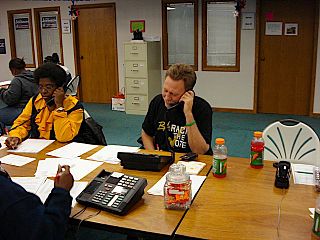The Lightweight Directory Access Protocol is an open, vendor-neutral, industry standard application protocol for accessing and maintaining distributed directory information services over an Internet Protocol (IP) network. Directory services play an important role in developing intranet and Internet applications by allowing the sharing of information about users, systems, networks, services, and applications throughout the network. As examples, directory services may provide any organized set of records, often with a hierarchical structure, such as a corporate email directory. Similarly, a telephone directory is a list of subscribers with an address and a phone number.
Remote access may refer to:
Voice over Internet Protocol (VoIP), also called IP telephony, is a method and group of technologies for voice calls for the delivery of voice communication sessions over Internet Protocol (IP) networks, such as the Internet.

Telemarketing is a method of direct marketing in which a salesperson solicits prospective customers to buy products, subscriptions or services, either over the phone or through a subsequent face to face or web conferencing appointment scheduled during the call. Telemarketing can also include recorded sales pitches programmed to be played over the phone via automatic dialing.

A telephone directory, commonly called a telephone book, telephone address book, phonebook, or the white and yellow pages, is a listing of telephone subscribers in a geographical area or subscribers to services provided by the organization that publishes the directory. Its purpose is to allow the telephone number of a subscriber identified by name and address to be found.
A voicemail system is a computer-based system that allows callers to leave a recorded message when the recipient has been unable or unwilling to answer the phone. Calls may be diverted to voicemail manually or automatically. The caller is prompted to leave a message and the recipient can retrieve the message at a later time.

The Minitel, officially known as TELETEL, was an interactive videotex online service accessible through telephone lines. It was the world's first and most successful mass-market online service prior to the World Wide Web. It was developed in Cesson-Sévigné, Brittany by government-owned France Télécom.
Telephone numbers in Japan consist of an area code, an exchange number, and a subscriber number.
GSM services are a standard collection of applications and features available over the Global System for Mobile Communications (GSM) to mobile phone subscribers all over the world. The GSM standards are defined by the 3GPP collaboration and implemented in hardware and software by equipment manufacturers and mobile phone operators. The common standard makes it possible to use the same phones with different companies' services, or even roam into different countries. GSM is the world's predominant mobile phone standard.
Web Services Discovery provides access to software systems over the Internet using standard protocols. In the most basic scenario there is a Web Service Provider that publishes a service and a Web Service Consumer that uses this service. Web Service Discovery is the process of finding suitable web services for a given task.
Yellow Book may refer to:
A white pages schema is a data model, specifically a logical schema, for organizing the data contained in entries in a directory service, database, or application, such as an address book. In a white pages directory, each entry typically represents an individual person that makes use of network resources, such as by receiving email or having an account to log into a system. In some environments, the schema may also include the representation of organizational divisions, roles, groups, and devices. The term is derived from the white pages, the listing of individuals in a telephone directory, typically sorted by the individual's home location and then by their name.
WHOIS is a query and response protocol that is used for querying databases that store an Internet resource's registered users or assignees. These resources include domain names, IP address blocks and autonomous systems, but it is also used for a wider range of other information. The protocol stores and delivers database content in a human-readable format. The current iteration of the WHOIS protocol was drafted by the Internet Society, and is documented in RFC 3912.
Information or info is the resolution of uncertainty, or a collection of related data or knowledge about a topic.
A reverse telephone directory is a collection of telephone numbers and associated customer details. However, unlike a standard telephone directory, where the user uses customer's details in order to retrieve the telephone number of that person or business, a reverse telephone directory allows users to search by a telephone service number in order to retrieve the customer details for that service.

Whitepages is a provider of online directory services, fraud screening, background checks and identity verification for consumers and businesses. It has the largest database available of contact information on residents of the United States.
This page is based on this
Wikipedia article Text is available under the
CC BY-SA 4.0 license; additional terms may apply.
Images, videos and audio are available under their respective licenses.



